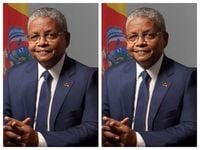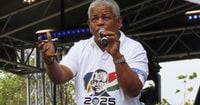Early voting is underway in Seychelles, where the island nation’s residents are facing a pivotal moment as they prepare to choose their next president and parliament. The picturesque archipelago, renowned for its turquoise waters and luxury resorts, is currently grappling with a deepening drug crisis and a heated debate over environmental stewardship, both of which loom large in the minds of voters as the September 27, 2025, election approaches.
According to the Associated Press, early balloting began on September 25, with election officials flying ballot papers to the country’s far-flung outer islands and opening special polling stations for seniors and essential workers. Manuella Amesbury, chief of the election commission, confirmed these efforts were designed to ensure broad participation in Africa’s smallest country by both land area and population.
At the center of the political contest is President Wavel Ramkalawan, an Anglican priest turned politician who made history in 2020 by becoming the first opposition leader to win the presidency since Seychelles gained independence in 1976. After five unsuccessful attempts, Ramkalawan’s sixth bid unseated the long-ruling party, signaling a dramatic shift in the nation’s political landscape. This year, he and his Linyon Demokratik Seselwa party are campaigning on promises of economic recovery, social development, and environmental sustainability—issues that have become ever more pressing for the island state.
Ramkalawan’s chief adversary is Patrick Herminie of the United Seychelles Party, a veteran lawmaker and former speaker of the National Assembly from 2007 to 2016. Herminie also previously chaired the country’s Agency for the Prevention of Drug Abuse and Rehabilitation. The president is elected for a five-year term, and if no candidate secures more than 50% of the vote, a runoff will be held between the top two contenders.
But beneath the surface of this high-stakes political contest is a country in the throes of a public health emergency. Seychelles has one of the world’s highest rates of heroin addiction—a staggering statistic for a nation of just 120,000 people. The Global Organized Crime Index in 2023 reported that around 6,000 Seychellois use heroin, with some independent analysts estimating addiction rates as high as 10%. The United Nations had already flagged Seychelles as a major drug transit route in a 2017 report, and the crisis has only intensified since then.
Critics argue that both leading candidates have failed to stem the tide of addiction. Ramkalawan’s government is accused of not doing enough to tackle the crisis, while Herminie’s tenure as head of the drug agency has been sharply criticized. Gerald Edwin Julie, a former program manager at the agency, minced no words, calling Herminie’s leadership "a political tool" and stating that Herminie "had no prior knowledge of drug addiction when appointed." Such frank assessments have fueled public skepticism about whether any candidate can truly address the problem.
Yet the drug epidemic is not the only source of anxiety for Seychellois voters. Environmental issues have surged to the fore, particularly in the wake of a controversial government decision to lease part of Assomption Island—the country’s largest island—to a Qatari company for luxury hotel development. The deal, which also includes the reconstruction of an airstrip to accommodate international flights, has ignited fierce debate over the nation’s sovereignty and environmental legacy.
Assomption Island lies perilously close to Aldabra Atoll, a UNESCO World Heritage marine reserve celebrated for its biodiversity. Environmental activists warn that dredging and construction associated with the hotel project could devastate fragile ecosystems. Just a week before the election, activists filed a constitutional challenge against the government, arguing that the deal puts Seychelles’ long-term welfare at risk in favor of foreign interests. Victoria Duthil, one of the plaintiffs, told the Associated Press, "The hotel development on Assomption has been clouded with controversy. Recent images of an injured tortoise and dredging that have emerged have highlighted how urgent the situation is."
The controversy has also rekindled broader concerns about government transparency and the influence of foreign capital in Seychelles, which, despite its small size, covers nearly 390,000 square kilometers of the Indian Ocean. The archipelago’s vulnerability to climate change and rising sea levels only adds to the urgency of these debates. The World Bank and the U.N. Sustainable Development Group have both underscored Seychelles’ precarious position as one of the world’s most at-risk nations when it comes to environmental threats.
Despite its environmental challenges, Seychelles has achieved enviable economic success. The country boasts the highest gross domestic product per capita in Africa, thanks largely to its thriving tourism sector and branding as an eco-friendly destination. This prosperity has fostered a growing middle class and, paradoxically, increased opposition to the ruling party as expectations for good governance and transparency rise.
Yet, memories of past corruption still linger. The three-decade presidency of France-Albert Rene, which ended in 2004, was marked by rampant graft—a legacy that continues to haunt the political scene. Although Seychelles now enjoys some of the lowest corruption rankings in sub-Saharan Africa, the current election campaign has been dogged by questions of integrity. Two other presidential candidates, Kisna Louise and Maarco Francis, face legal scrutiny—Louise for an ongoing investigation and Francis for allegedly forging a university degree.
The skepticism extends to ordinary citizens. Jean Paul Maurel, a local businessman, summed up a widely held sentiment: "There are no good candidates." Others, however, are more willing to give the incumbent another chance. Paul Harry Michaud, a retired businessman, argued, "Wavel should have another five years. The opposition had 43 years and they did nothing." Meanwhile, Barry Gappy, a retired army official, pointed to the opposition’s "better manifesto" as his reason for support.
As the ballots are cast and the nation awaits the results, Seychelles stands at a crossroads. The outcome will determine not only who leads this island paradise but also how it confronts the intertwined challenges of addiction, environmental stewardship, and good governance. For this small but globally significant nation, the stakes could hardly be higher.



